Starbucks Corporation: Strategic Analysis
VerifiedAdded on 2020/05/11
|13
|2134
|68
AI Summary
This assignment delves into a comprehensive analysis of Starbucks Corporation, examining its organizational structure, key departments, and strategic factors. It identifies the company's strengths such as product quality, growth strategy, and employee treatment. The analysis also highlights weaknesses like high prices and lack of distinctive market positioning. Opportunities for expansion in Central Europe, Africa, and India are explored, along with the potential to introduce new products and co-brand. The assignment concludes by outlining threats from competitors like Dunkin' Donuts and McDonald's, recognizing Starbucks' dependence on its popularity in coffee, tea, and snacks.
Contribute Materials
Your contribution can guide someone’s learning journey. Share your
documents today.
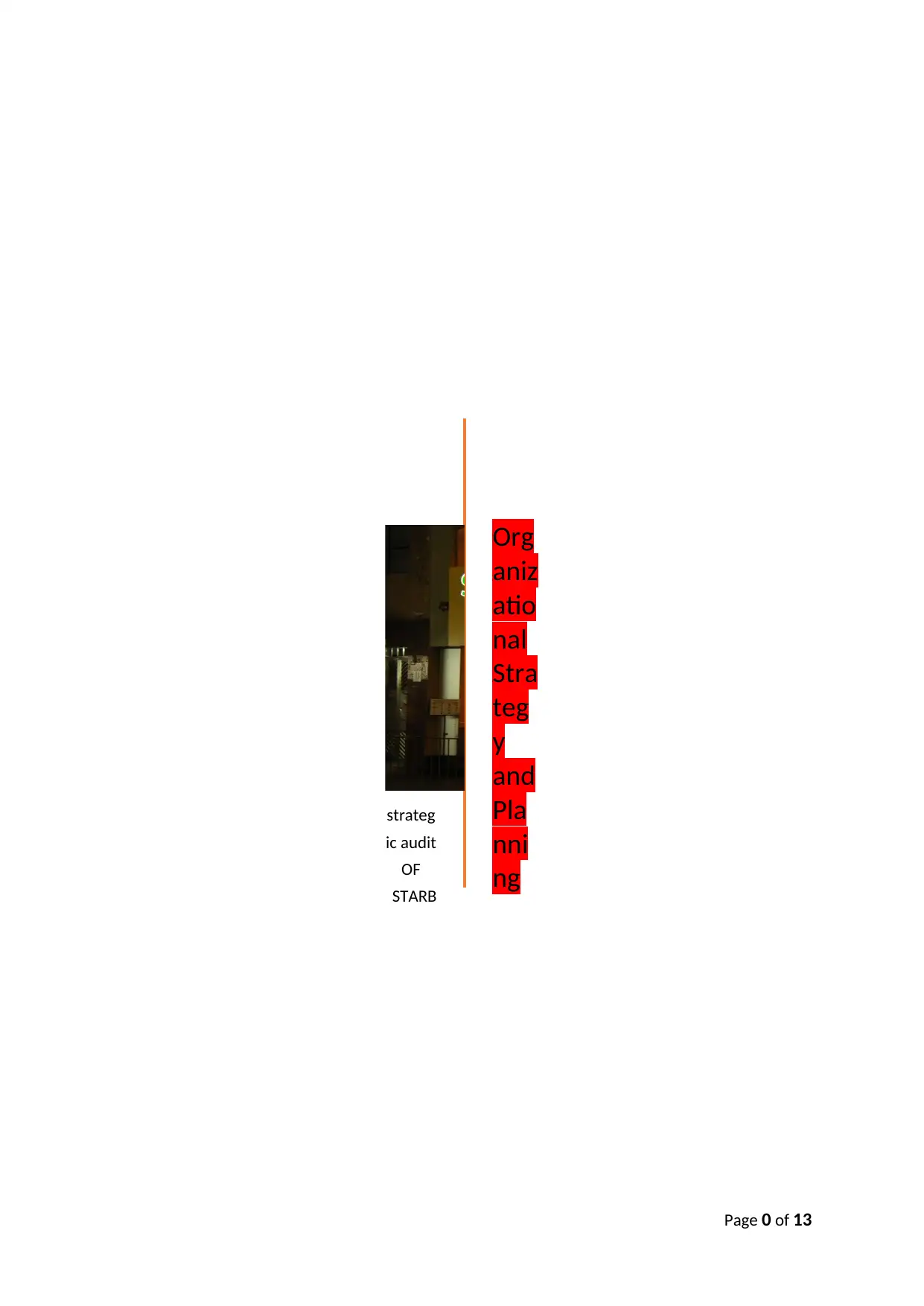
Page 0 of 13
strateg
ic audit
OF
STARB
Org
aniz
atio
nal
Stra
teg
y
and
Pla
nni
ng
strateg
ic audit
OF
STARB
Org
aniz
atio
nal
Stra
teg
y
and
Pla
nni
ng
Secure Best Marks with AI Grader
Need help grading? Try our AI Grader for instant feedback on your assignments.
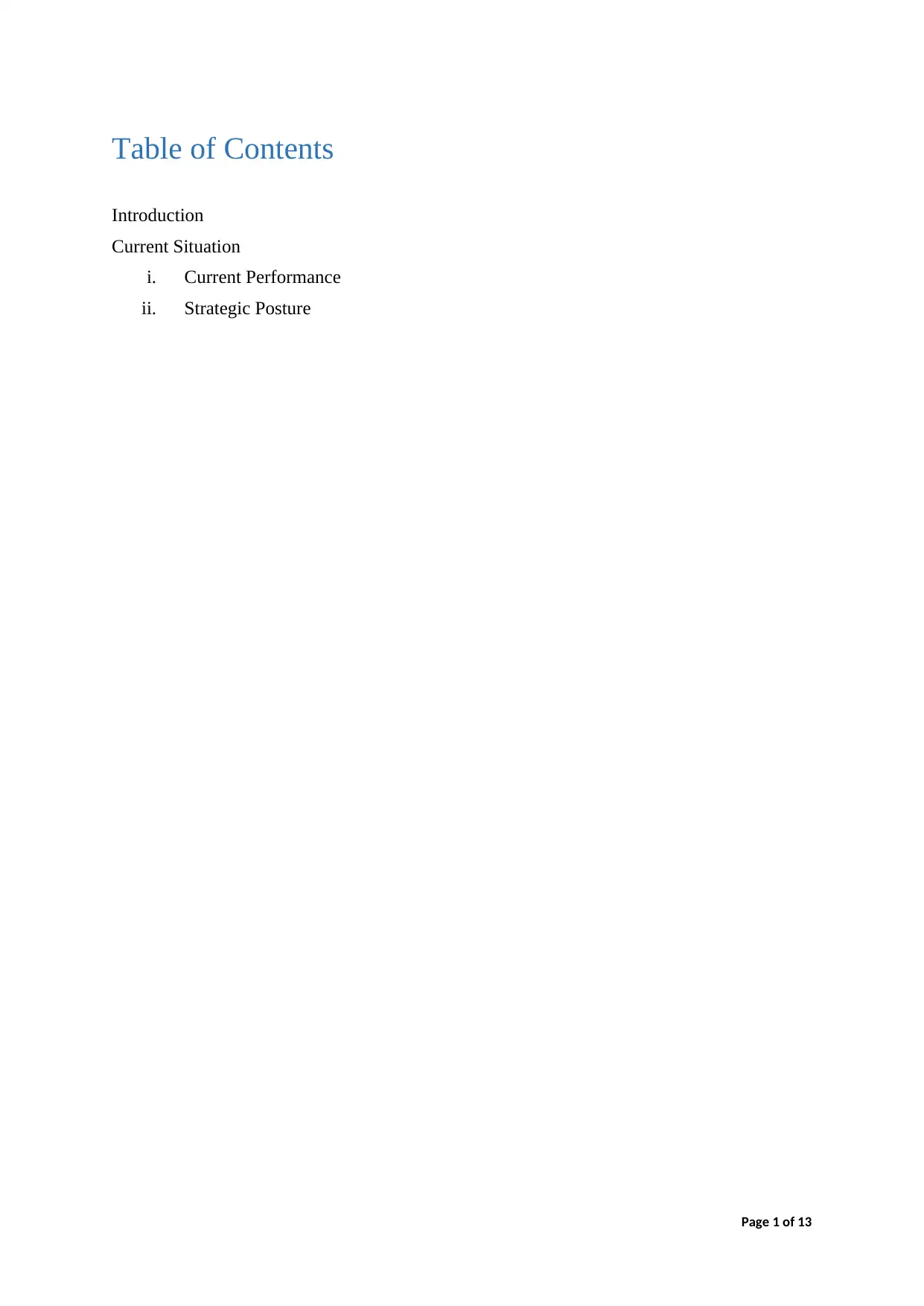
Table of Contents
Introduction
Current Situation
i. Current Performance
ii. Strategic Posture
Page 1 of 13
Introduction
Current Situation
i. Current Performance
ii. Strategic Posture
Page 1 of 13
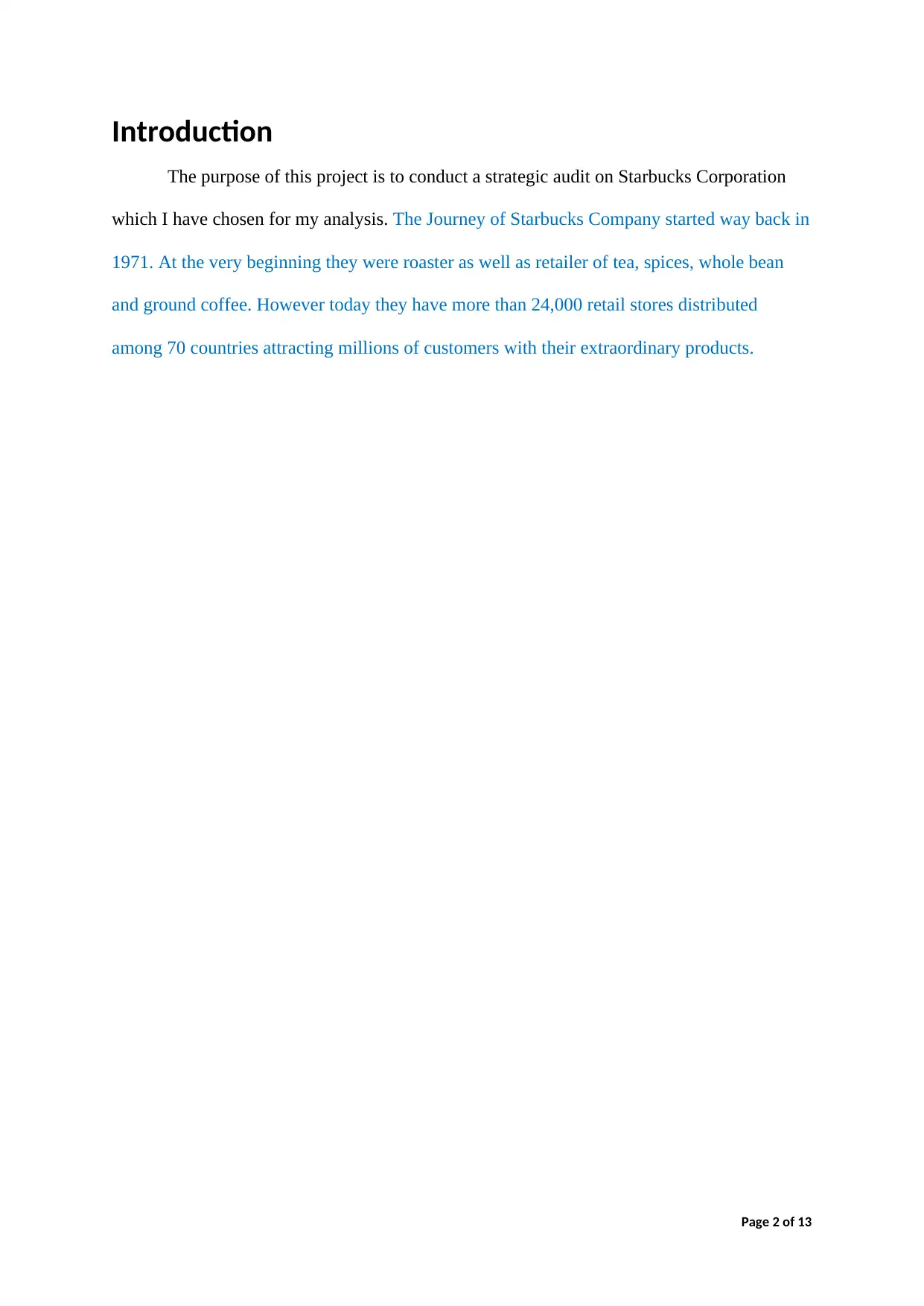
Introduction
The purpose of this project is to conduct a strategic audit on Starbucks Corporation
which I have chosen for my analysis. The Journey of Starbucks Company started way back in
1971. At the very beginning they were roaster as well as retailer of tea, spices, whole bean
and ground coffee. However today they have more than 24,000 retail stores distributed
among 70 countries attracting millions of customers with their extraordinary products.
Page 2 of 13
The purpose of this project is to conduct a strategic audit on Starbucks Corporation
which I have chosen for my analysis. The Journey of Starbucks Company started way back in
1971. At the very beginning they were roaster as well as retailer of tea, spices, whole bean
and ground coffee. However today they have more than 24,000 retail stores distributed
among 70 countries attracting millions of customers with their extraordinary products.
Page 2 of 13
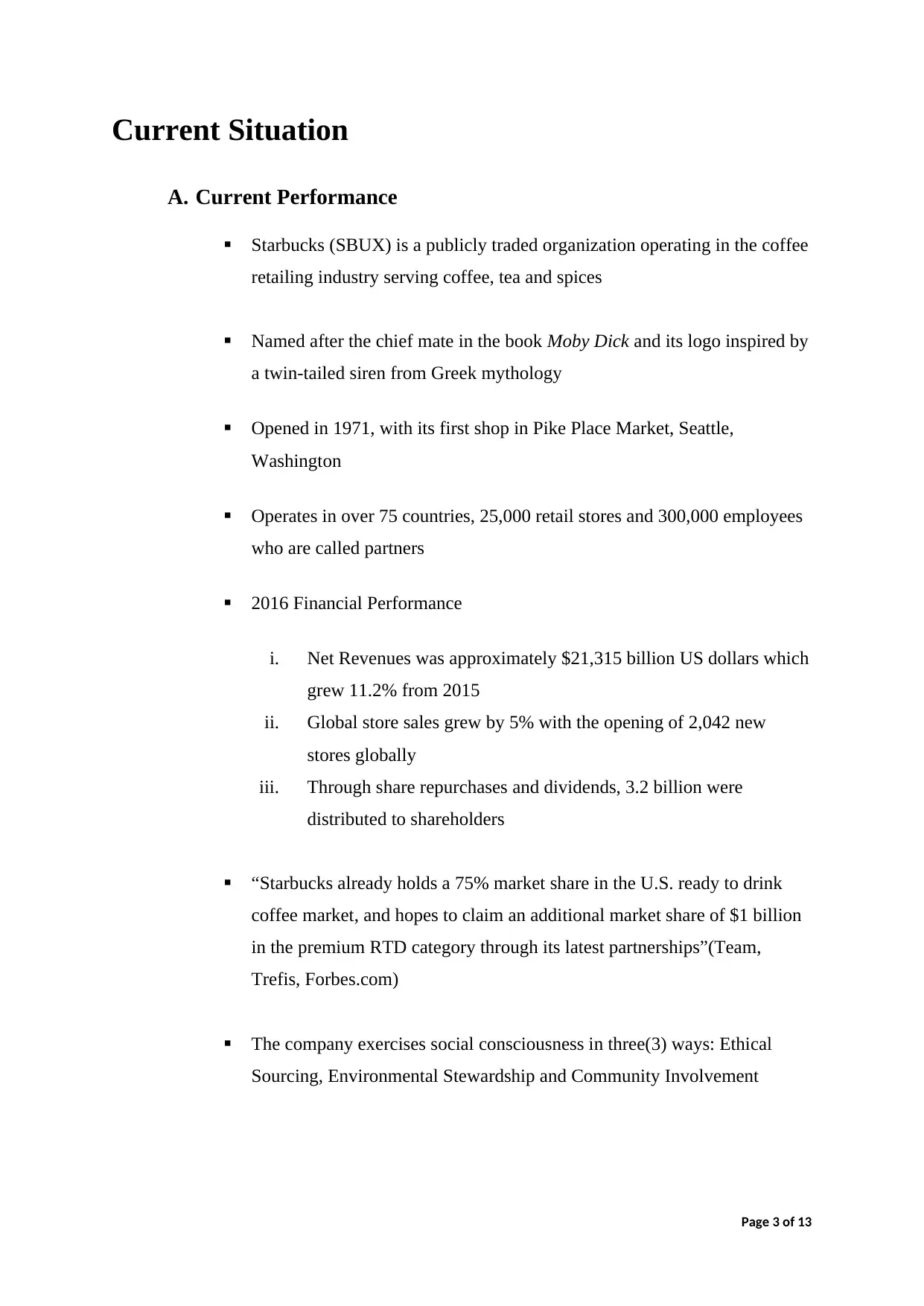
Current Situation
A. Current Performance
Starbucks (SBUX) is a publicly traded organization operating in the coffee
retailing industry serving coffee, tea and spices
Named after the chief mate in the book Moby Dick and its logo inspired by
a twin-tailed siren from Greek mythology
Opened in 1971, with its first shop in Pike Place Market, Seattle,
Washington
Operates in over 75 countries, 25,000 retail stores and 300,000 employees
who are called partners
2016 Financial Performance
i. Net Revenues was approximately $21,315 billion US dollars which
grew 11.2% from 2015
ii. Global store sales grew by 5% with the opening of 2,042 new
stores globally
iii. Through share repurchases and dividends, 3.2 billion were
distributed to shareholders
“Starbucks already holds a 75% market share in the U.S. ready to drink
coffee market, and hopes to claim an additional market share of $1 billion
in the premium RTD category through its latest partnerships”(Team,
Trefis, Forbes.com)
The company exercises social consciousness in three(3) ways: Ethical
Sourcing, Environmental Stewardship and Community Involvement
Page 3 of 13
A. Current Performance
Starbucks (SBUX) is a publicly traded organization operating in the coffee
retailing industry serving coffee, tea and spices
Named after the chief mate in the book Moby Dick and its logo inspired by
a twin-tailed siren from Greek mythology
Opened in 1971, with its first shop in Pike Place Market, Seattle,
Washington
Operates in over 75 countries, 25,000 retail stores and 300,000 employees
who are called partners
2016 Financial Performance
i. Net Revenues was approximately $21,315 billion US dollars which
grew 11.2% from 2015
ii. Global store sales grew by 5% with the opening of 2,042 new
stores globally
iii. Through share repurchases and dividends, 3.2 billion were
distributed to shareholders
“Starbucks already holds a 75% market share in the U.S. ready to drink
coffee market, and hopes to claim an additional market share of $1 billion
in the premium RTD category through its latest partnerships”(Team,
Trefis, Forbes.com)
The company exercises social consciousness in three(3) ways: Ethical
Sourcing, Environmental Stewardship and Community Involvement
Page 3 of 13
Secure Best Marks with AI Grader
Need help grading? Try our AI Grader for instant feedback on your assignments.
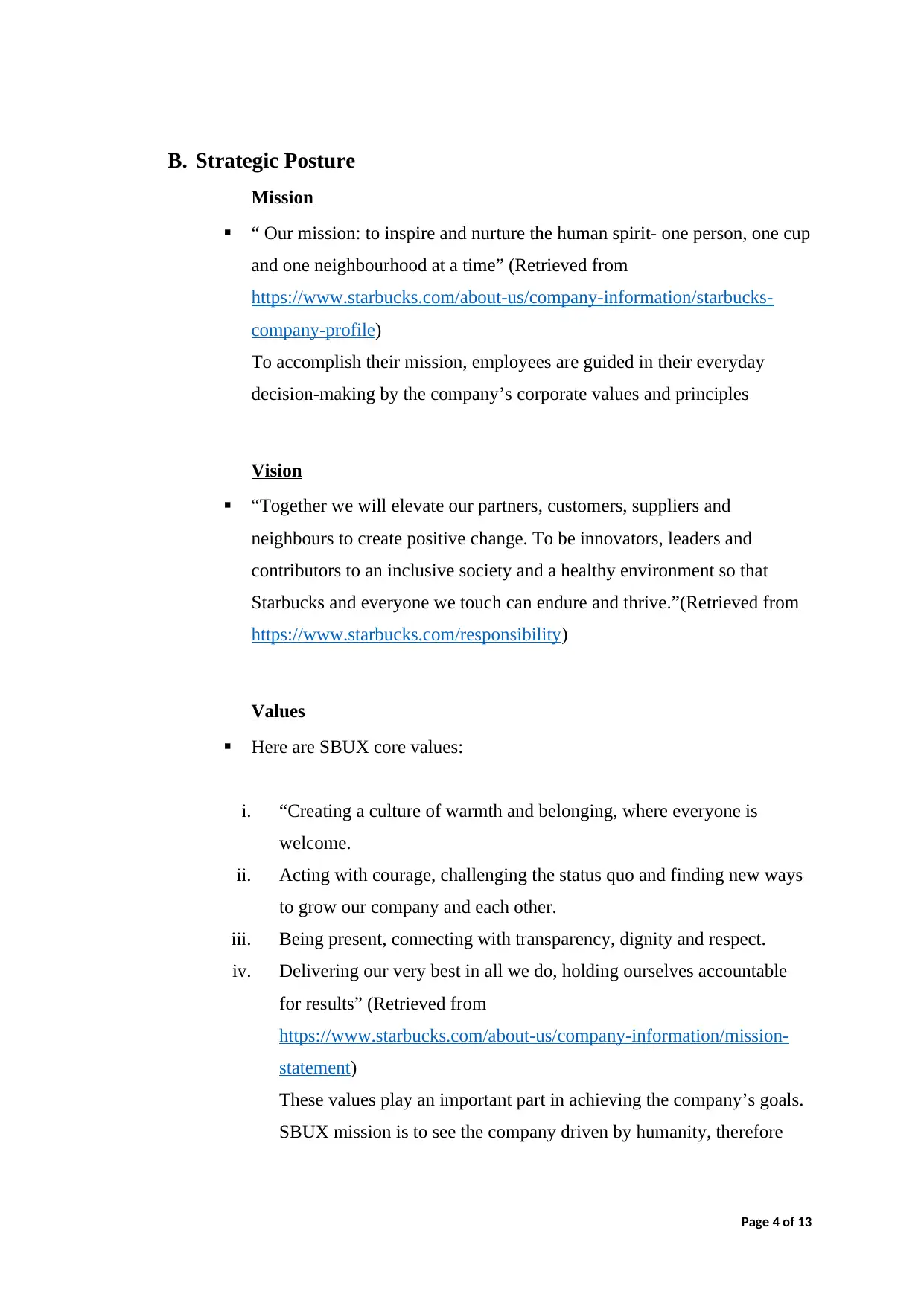
B. Strategic Posture
Mission
“ Our mission: to inspire and nurture the human spirit- one person, one cup
and one neighbourhood at a time” (Retrieved from
https://www.starbucks.com/about-us/company-information/starbucks-
company-profile)
To accomplish their mission, employees are guided in their everyday
decision-making by the company’s corporate values and principles
Vision
“Together we will elevate our partners, customers, suppliers and
neighbours to create positive change. To be innovators, leaders and
contributors to an inclusive society and a healthy environment so that
Starbucks and everyone we touch can endure and thrive.”(Retrieved from
https://www.starbucks.com/responsibility)
Values
Here are SBUX core values:
i. “Creating a culture of warmth and belonging, where everyone is
welcome.
ii. Acting with courage, challenging the status quo and finding new ways
to grow our company and each other.
iii. Being present, connecting with transparency, dignity and respect.
iv. Delivering our very best in all we do, holding ourselves accountable
for results” (Retrieved from
https://www.starbucks.com/about-us/company-information/mission-
statement)
These values play an important part in achieving the company’s goals.
SBUX mission is to see the company driven by humanity, therefore
Page 4 of 13
Mission
“ Our mission: to inspire and nurture the human spirit- one person, one cup
and one neighbourhood at a time” (Retrieved from
https://www.starbucks.com/about-us/company-information/starbucks-
company-profile)
To accomplish their mission, employees are guided in their everyday
decision-making by the company’s corporate values and principles
Vision
“Together we will elevate our partners, customers, suppliers and
neighbours to create positive change. To be innovators, leaders and
contributors to an inclusive society and a healthy environment so that
Starbucks and everyone we touch can endure and thrive.”(Retrieved from
https://www.starbucks.com/responsibility)
Values
Here are SBUX core values:
i. “Creating a culture of warmth and belonging, where everyone is
welcome.
ii. Acting with courage, challenging the status quo and finding new ways
to grow our company and each other.
iii. Being present, connecting with transparency, dignity and respect.
iv. Delivering our very best in all we do, holding ourselves accountable
for results” (Retrieved from
https://www.starbucks.com/about-us/company-information/mission-
statement)
These values play an important part in achieving the company’s goals.
SBUX mission is to see the company driven by humanity, therefore
Page 4 of 13
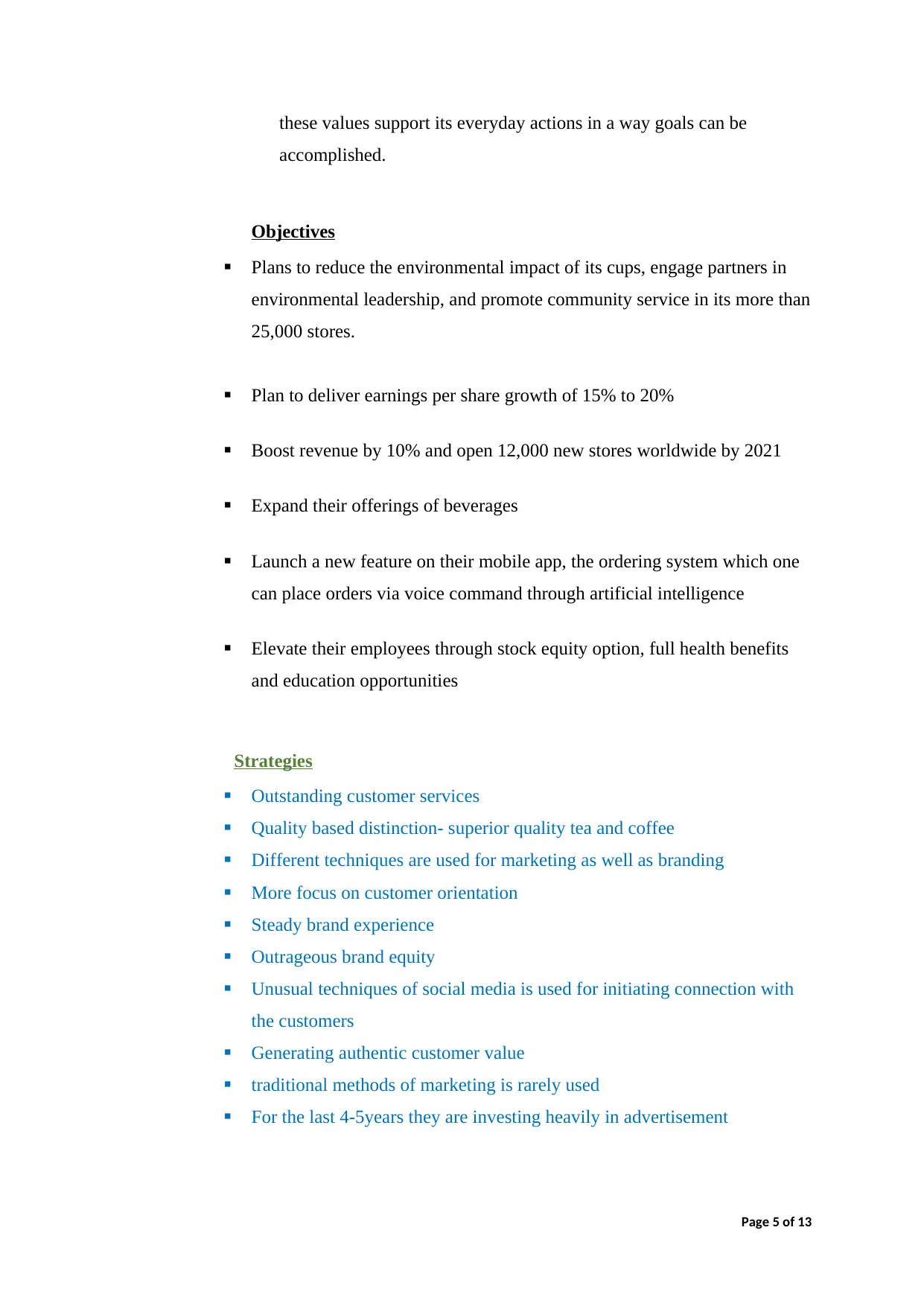
these values support its everyday actions in a way goals can be
accomplished.
Objectives
Plans to reduce the environmental impact of its cups, engage partners in
environmental leadership, and promote community service in its more than
25,000 stores.
Plan to deliver earnings per share growth of 15% to 20%
Boost revenue by 10% and open 12,000 new stores worldwide by 2021
Expand their offerings of beverages
Launch a new feature on their mobile app, the ordering system which one
can place orders via voice command through artificial intelligence
Elevate their employees through stock equity option, full health benefits
and education opportunities
Strategies
Outstanding customer services
Quality based distinction- superior quality tea and coffee
Different techniques are used for marketing as well as branding
More focus on customer orientation
Steady brand experience
Outrageous brand equity
Unusual techniques of social media is used for initiating connection with
the customers
Generating authentic customer value
traditional methods of marketing is rarely used
For the last 4-5years they are investing heavily in advertisement
Page 5 of 13
accomplished.
Objectives
Plans to reduce the environmental impact of its cups, engage partners in
environmental leadership, and promote community service in its more than
25,000 stores.
Plan to deliver earnings per share growth of 15% to 20%
Boost revenue by 10% and open 12,000 new stores worldwide by 2021
Expand their offerings of beverages
Launch a new feature on their mobile app, the ordering system which one
can place orders via voice command through artificial intelligence
Elevate their employees through stock equity option, full health benefits
and education opportunities
Strategies
Outstanding customer services
Quality based distinction- superior quality tea and coffee
Different techniques are used for marketing as well as branding
More focus on customer orientation
Steady brand experience
Outrageous brand equity
Unusual techniques of social media is used for initiating connection with
the customers
Generating authentic customer value
traditional methods of marketing is rarely used
For the last 4-5years they are investing heavily in advertisement
Page 5 of 13
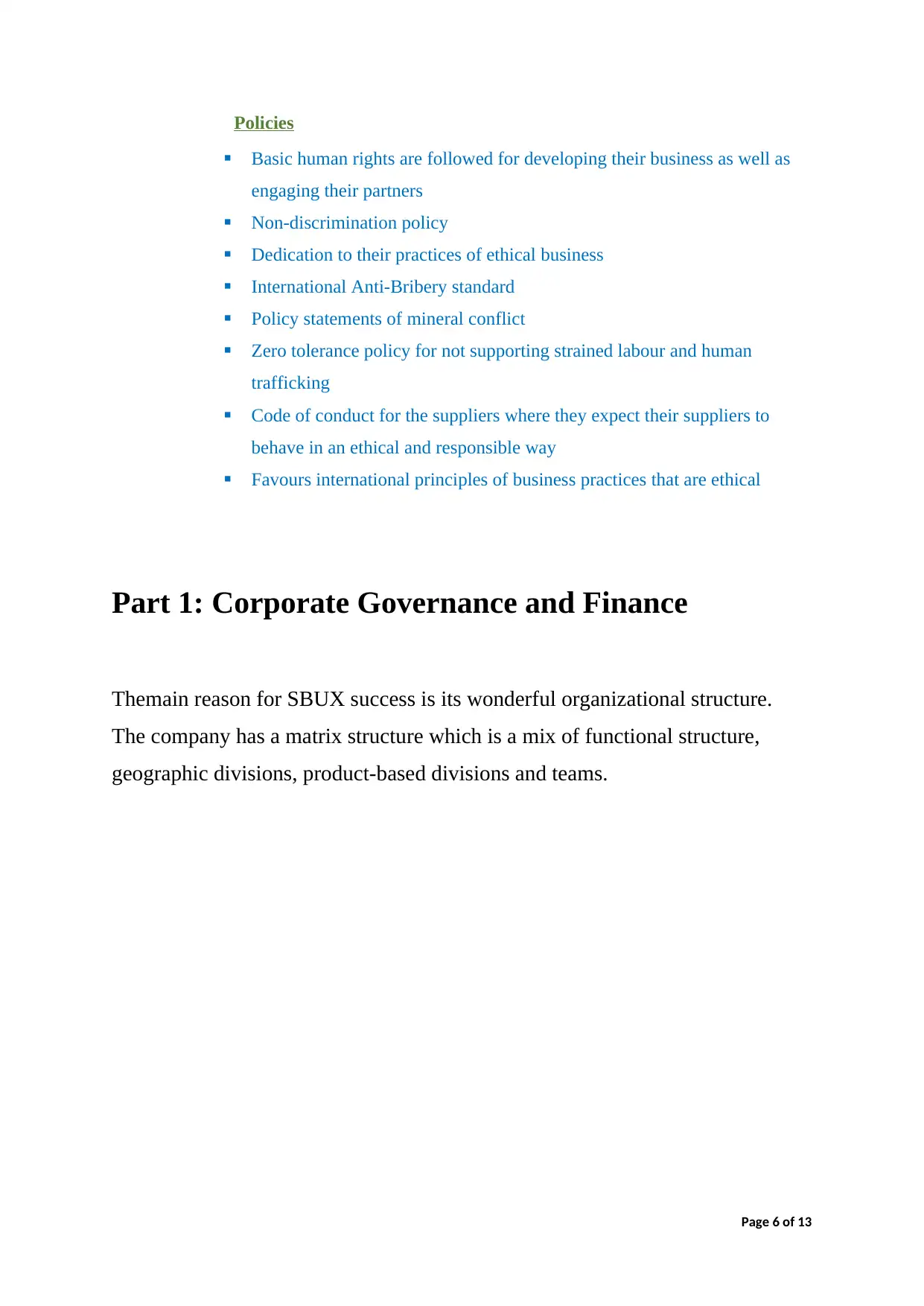
Policies
Basic human rights are followed for developing their business as well as
engaging their partners
Non-discrimination policy
Dedication to their practices of ethical business
International Anti-Bribery standard
Policy statements of mineral conflict
Zero tolerance policy for not supporting strained labour and human
trafficking
Code of conduct for the suppliers where they expect their suppliers to
behave in an ethical and responsible way
Favours international principles of business practices that are ethical
Part 1: Corporate Governance and Finance
Themain reason for SBUX success is its wonderful organizational structure.
The company has a matrix structure which is a mix of functional structure,
geographic divisions, product-based divisions and teams.
Page 6 of 13
Basic human rights are followed for developing their business as well as
engaging their partners
Non-discrimination policy
Dedication to their practices of ethical business
International Anti-Bribery standard
Policy statements of mineral conflict
Zero tolerance policy for not supporting strained labour and human
trafficking
Code of conduct for the suppliers where they expect their suppliers to
behave in an ethical and responsible way
Favours international principles of business practices that are ethical
Part 1: Corporate Governance and Finance
Themain reason for SBUX success is its wonderful organizational structure.
The company has a matrix structure which is a mix of functional structure,
geographic divisions, product-based divisions and teams.
Page 6 of 13
Paraphrase This Document
Need a fresh take? Get an instant paraphrase of this document with our AI Paraphraser
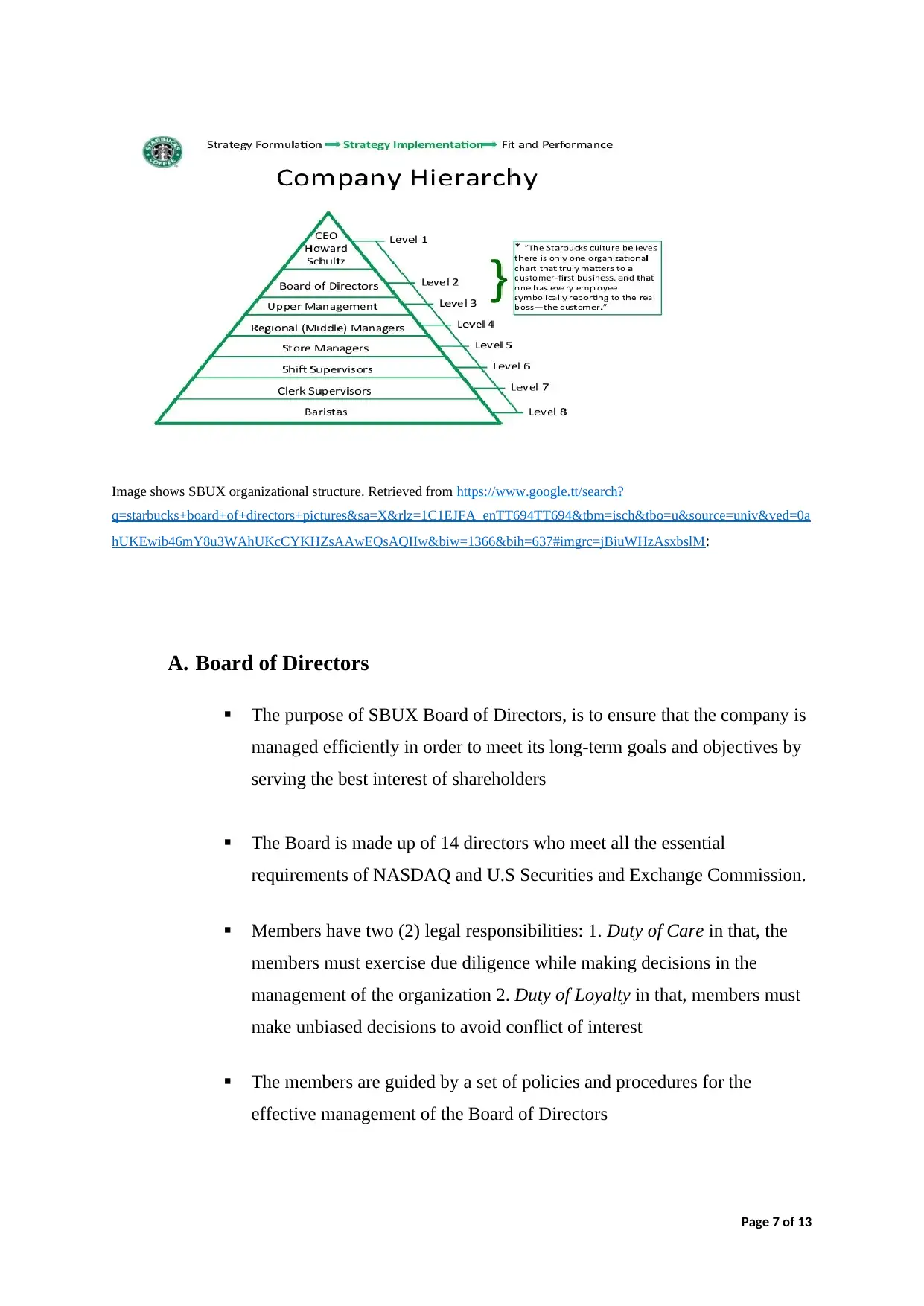
Image shows SBUX organizational structure. Retrieved from https://www.google.tt/search?
q=starbucks+board+of+directors+pictures&sa=X&rlz=1C1EJFA_enTT694TT694&tbm=isch&tbo=u&source=univ&ved=0a
hUKEwib46mY8u3WAhUKcCYKHZsAAwEQsAQIIw&biw=1366&bih=637#imgrc=jBiuWHzAsxbslM:
A. Board of Directors
The purpose of SBUX Board of Directors, is to ensure that the company is
managed efficiently in order to meet its long-term goals and objectives by
serving the best interest of shareholders
The Board is made up of 14 directors who meet all the essential
requirements of NASDAQ and U.S Securities and Exchange Commission.
Members have two (2) legal responsibilities: 1. Duty of Care in that, the
members must exercise due diligence while making decisions in the
management of the organization 2. Duty of Loyalty in that, members must
make unbiased decisions to avoid conflict of interest
The members are guided by a set of policies and procedures for the
effective management of the Board of Directors
Page 7 of 13
q=starbucks+board+of+directors+pictures&sa=X&rlz=1C1EJFA_enTT694TT694&tbm=isch&tbo=u&source=univ&ved=0a
hUKEwib46mY8u3WAhUKcCYKHZsAAwEQsAQIIw&biw=1366&bih=637#imgrc=jBiuWHzAsxbslM:
A. Board of Directors
The purpose of SBUX Board of Directors, is to ensure that the company is
managed efficiently in order to meet its long-term goals and objectives by
serving the best interest of shareholders
The Board is made up of 14 directors who meet all the essential
requirements of NASDAQ and U.S Securities and Exchange Commission.
Members have two (2) legal responsibilities: 1. Duty of Care in that, the
members must exercise due diligence while making decisions in the
management of the organization 2. Duty of Loyalty in that, members must
make unbiased decisions to avoid conflict of interest
The members are guided by a set of policies and procedures for the
effective management of the Board of Directors
Page 7 of 13
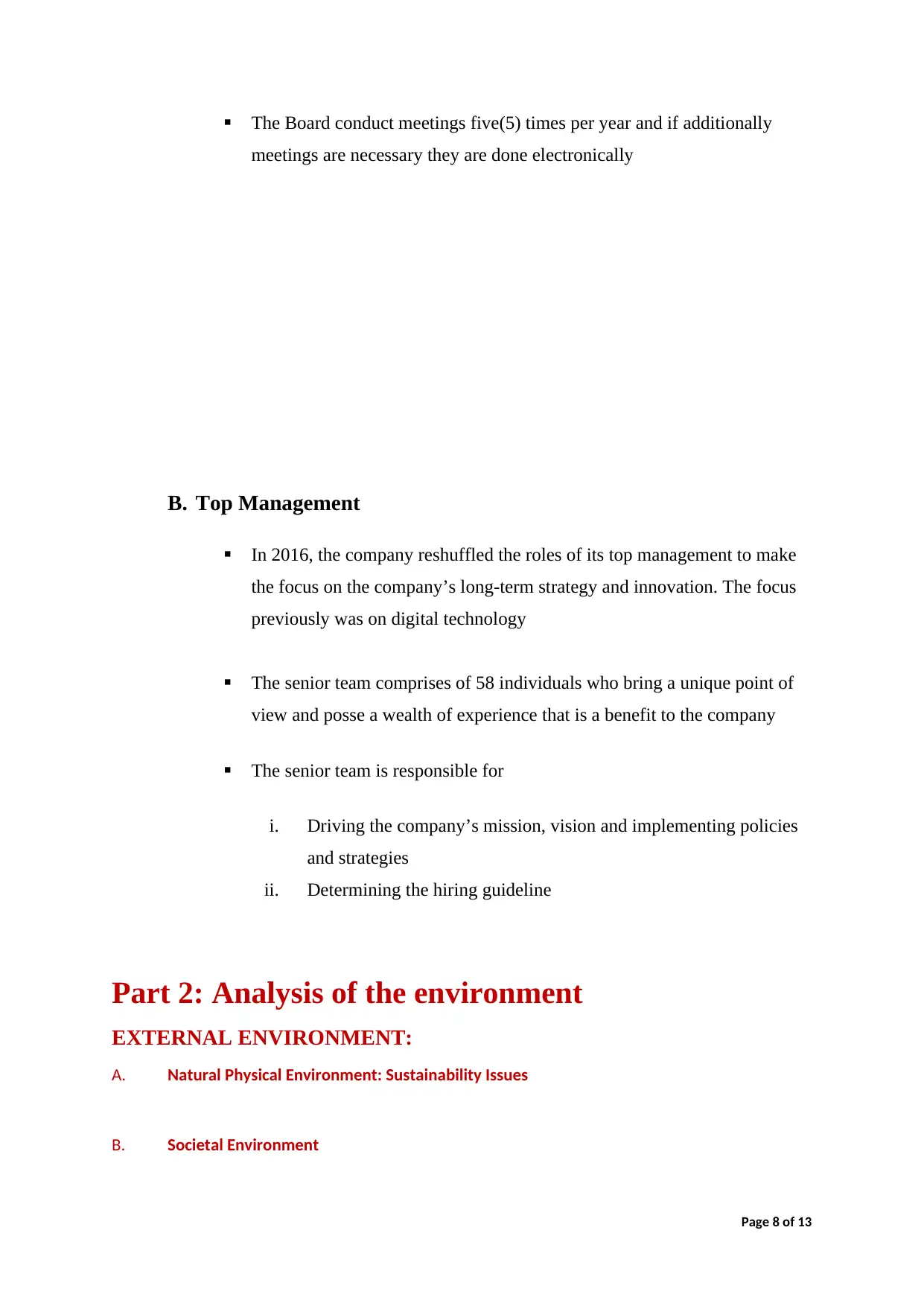
The Board conduct meetings five(5) times per year and if additionally
meetings are necessary they are done electronically
B. Top Management
In 2016, the company reshuffled the roles of its top management to make
the focus on the company’s long-term strategy and innovation. The focus
previously was on digital technology
The senior team comprises of 58 individuals who bring a unique point of
view and posse a wealth of experience that is a benefit to the company
The senior team is responsible for
i. Driving the company’s mission, vision and implementing policies
and strategies
ii. Determining the hiring guideline
Part 2: Analysis of the environment
EXTERNAL ENVIRONMENT:
A. Natural Physical Environment: Sustainability Issues
B. Societal Environment
Page 8 of 13
meetings are necessary they are done electronically
B. Top Management
In 2016, the company reshuffled the roles of its top management to make
the focus on the company’s long-term strategy and innovation. The focus
previously was on digital technology
The senior team comprises of 58 individuals who bring a unique point of
view and posse a wealth of experience that is a benefit to the company
The senior team is responsible for
i. Driving the company’s mission, vision and implementing policies
and strategies
ii. Determining the hiring guideline
Part 2: Analysis of the environment
EXTERNAL ENVIRONMENT:
A. Natural Physical Environment: Sustainability Issues
B. Societal Environment
Page 8 of 13
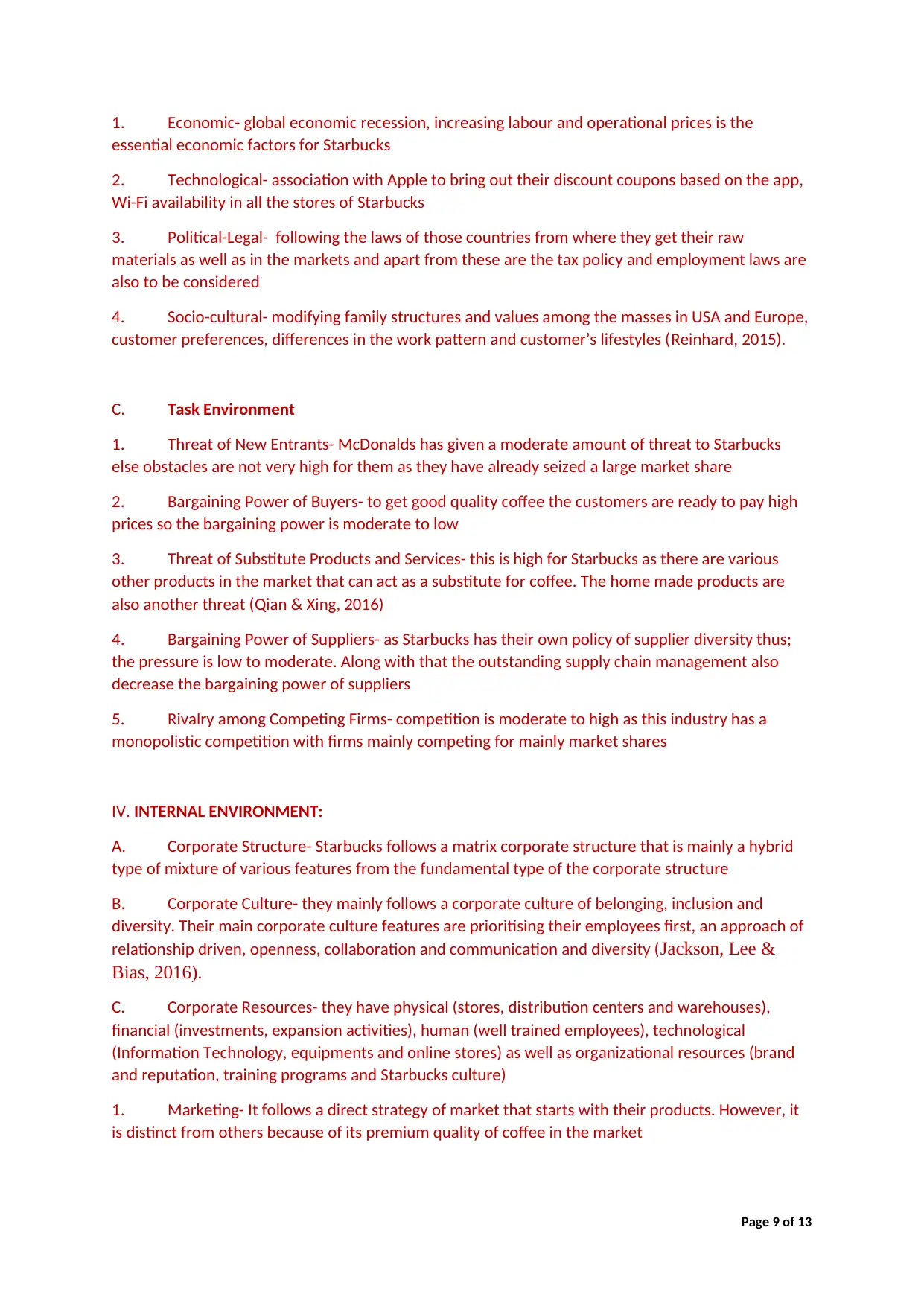
1. Economic- global economic recession, increasing labour and operational prices is the
essential economic factors for Starbucks
2. Technological- association with Apple to bring out their discount coupons based on the app,
Wi-Fi availability in all the stores of Starbucks
3. Political-Legal- following the laws of those countries from where they get their raw
materials as well as in the markets and apart from these are the tax policy and employment laws are
also to be considered
4. Socio-cultural- modifying family structures and values among the masses in USA and Europe,
customer preferences, differences in the work pattern and customer’s lifestyles (Reinhard, 2015).
C. Task Environment
1. Threat of New Entrants- McDonalds has given a moderate amount of threat to Starbucks
else obstacles are not very high for them as they have already seized a large market share
2. Bargaining Power of Buyers- to get good quality coffee the customers are ready to pay high
prices so the bargaining power is moderate to low
3. Threat of Substitute Products and Services- this is high for Starbucks as there are various
other products in the market that can act as a substitute for coffee. The home made products are
also another threat (Qian & Xing, 2016)
4. Bargaining Power of Suppliers- as Starbucks has their own policy of supplier diversity thus;
the pressure is low to moderate. Along with that the outstanding supply chain management also
decrease the bargaining power of suppliers
5. Rivalry among Competing Firms- competition is moderate to high as this industry has a
monopolistic competition with firms mainly competing for mainly market shares
IV. INTERNAL ENVIRONMENT:
A. Corporate Structure- Starbucks follows a matrix corporate structure that is mainly a hybrid
type of mixture of various features from the fundamental type of the corporate structure
B. Corporate Culture- they mainly follows a corporate culture of belonging, inclusion and
diversity. Their main corporate culture features are prioritising their employees first, an approach of
relationship driven, openness, collaboration and communication and diversity (Jackson, Lee &
Bias, 2016).
C. Corporate Resources- they have physical (stores, distribution centers and warehouses),
financial (investments, expansion activities), human (well trained employees), technological
(Information Technology, equipments and online stores) as well as organizational resources (brand
and reputation, training programs and Starbucks culture)
1. Marketing- It follows a direct strategy of market that starts with their products. However, it
is distinct from others because of its premium quality of coffee in the market
Page 9 of 13
essential economic factors for Starbucks
2. Technological- association with Apple to bring out their discount coupons based on the app,
Wi-Fi availability in all the stores of Starbucks
3. Political-Legal- following the laws of those countries from where they get their raw
materials as well as in the markets and apart from these are the tax policy and employment laws are
also to be considered
4. Socio-cultural- modifying family structures and values among the masses in USA and Europe,
customer preferences, differences in the work pattern and customer’s lifestyles (Reinhard, 2015).
C. Task Environment
1. Threat of New Entrants- McDonalds has given a moderate amount of threat to Starbucks
else obstacles are not very high for them as they have already seized a large market share
2. Bargaining Power of Buyers- to get good quality coffee the customers are ready to pay high
prices so the bargaining power is moderate to low
3. Threat of Substitute Products and Services- this is high for Starbucks as there are various
other products in the market that can act as a substitute for coffee. The home made products are
also another threat (Qian & Xing, 2016)
4. Bargaining Power of Suppliers- as Starbucks has their own policy of supplier diversity thus;
the pressure is low to moderate. Along with that the outstanding supply chain management also
decrease the bargaining power of suppliers
5. Rivalry among Competing Firms- competition is moderate to high as this industry has a
monopolistic competition with firms mainly competing for mainly market shares
IV. INTERNAL ENVIRONMENT:
A. Corporate Structure- Starbucks follows a matrix corporate structure that is mainly a hybrid
type of mixture of various features from the fundamental type of the corporate structure
B. Corporate Culture- they mainly follows a corporate culture of belonging, inclusion and
diversity. Their main corporate culture features are prioritising their employees first, an approach of
relationship driven, openness, collaboration and communication and diversity (Jackson, Lee &
Bias, 2016).
C. Corporate Resources- they have physical (stores, distribution centers and warehouses),
financial (investments, expansion activities), human (well trained employees), technological
(Information Technology, equipments and online stores) as well as organizational resources (brand
and reputation, training programs and Starbucks culture)
1. Marketing- It follows a direct strategy of market that starts with their products. However, it
is distinct from others because of its premium quality of coffee in the market
Page 9 of 13
Secure Best Marks with AI Grader
Need help grading? Try our AI Grader for instant feedback on your assignments.
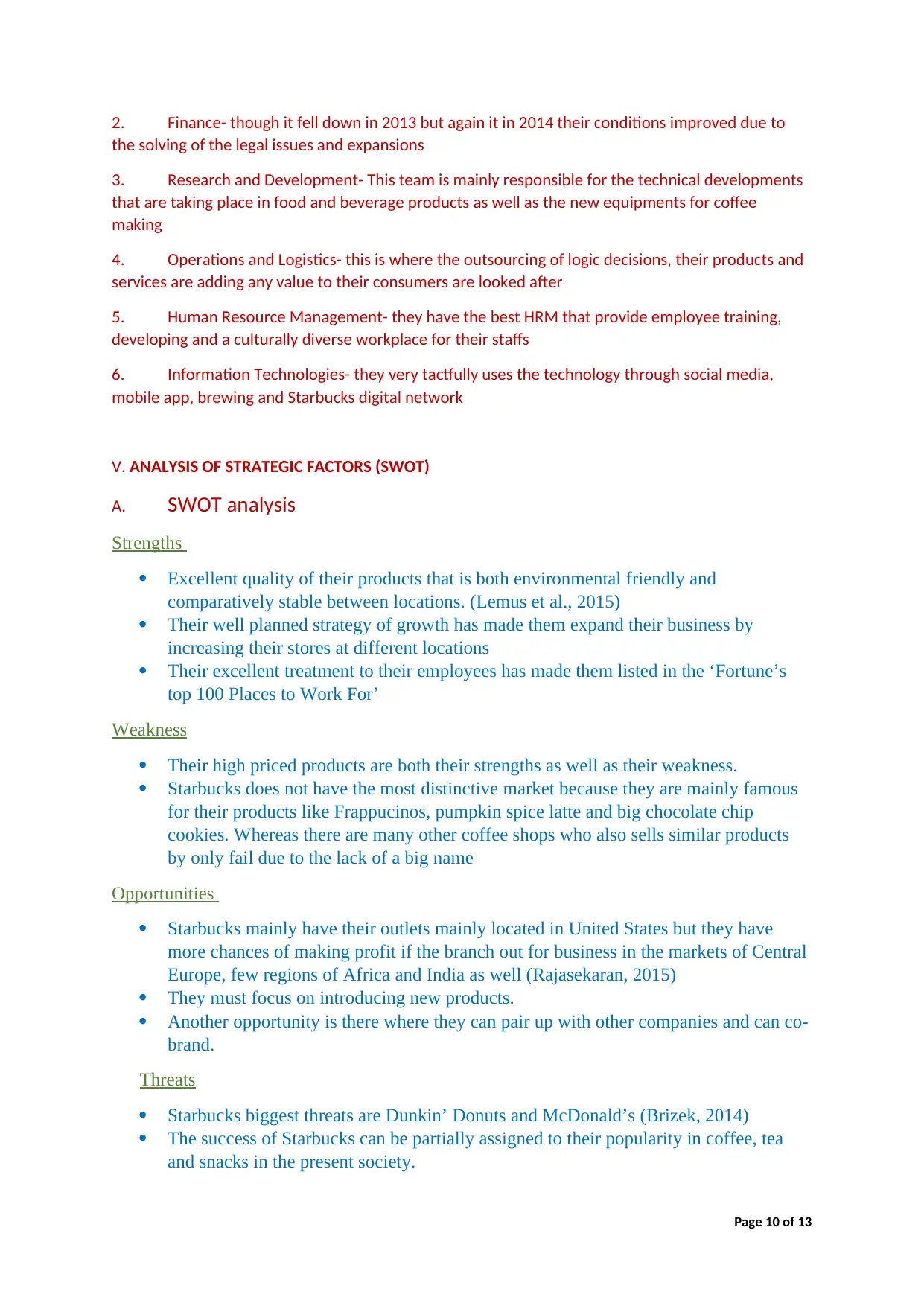
2. Finance- though it fell down in 2013 but again it in 2014 their conditions improved due to
the solving of the legal issues and expansions
3. Research and Development- This team is mainly responsible for the technical developments
that are taking place in food and beverage products as well as the new equipments for coffee
making
4. Operations and Logistics- this is where the outsourcing of logic decisions, their products and
services are adding any value to their consumers are looked after
5. Human Resource Management- they have the best HRM that provide employee training,
developing and a culturally diverse workplace for their staffs
6. Information Technologies- they very tactfully uses the technology through social media,
mobile app, brewing and Starbucks digital network
V. ANALYSIS OF STRATEGIC FACTORS (SWOT)
A. SWOT analysis
Strengths
Excellent quality of their products that is both environmental friendly and
comparatively stable between locations. (Lemus et al., 2015)
Their well planned strategy of growth has made them expand their business by
increasing their stores at different locations
Their excellent treatment to their employees has made them listed in the ‘Fortune’s
top 100 Places to Work For’
Weakness
Their high priced products are both their strengths as well as their weakness.
Starbucks does not have the most distinctive market because they are mainly famous
for their products like Frappucinos, pumpkin spice latte and big chocolate chip
cookies. Whereas there are many other coffee shops who also sells similar products
by only fail due to the lack of a big name
Opportunities
Starbucks mainly have their outlets mainly located in United States but they have
more chances of making profit if the branch out for business in the markets of Central
Europe, few regions of Africa and India as well (Rajasekaran, 2015)
They must focus on introducing new products.
Another opportunity is there where they can pair up with other companies and can co-
brand.
Threats
Starbucks biggest threats are Dunkin’ Donuts and McDonald’s (Brizek, 2014)
The success of Starbucks can be partially assigned to their popularity in coffee, tea
and snacks in the present society.
Page 10 of 13
the solving of the legal issues and expansions
3. Research and Development- This team is mainly responsible for the technical developments
that are taking place in food and beverage products as well as the new equipments for coffee
making
4. Operations and Logistics- this is where the outsourcing of logic decisions, their products and
services are adding any value to their consumers are looked after
5. Human Resource Management- they have the best HRM that provide employee training,
developing and a culturally diverse workplace for their staffs
6. Information Technologies- they very tactfully uses the technology through social media,
mobile app, brewing and Starbucks digital network
V. ANALYSIS OF STRATEGIC FACTORS (SWOT)
A. SWOT analysis
Strengths
Excellent quality of their products that is both environmental friendly and
comparatively stable between locations. (Lemus et al., 2015)
Their well planned strategy of growth has made them expand their business by
increasing their stores at different locations
Their excellent treatment to their employees has made them listed in the ‘Fortune’s
top 100 Places to Work For’
Weakness
Their high priced products are both their strengths as well as their weakness.
Starbucks does not have the most distinctive market because they are mainly famous
for their products like Frappucinos, pumpkin spice latte and big chocolate chip
cookies. Whereas there are many other coffee shops who also sells similar products
by only fail due to the lack of a big name
Opportunities
Starbucks mainly have their outlets mainly located in United States but they have
more chances of making profit if the branch out for business in the markets of Central
Europe, few regions of Africa and India as well (Rajasekaran, 2015)
They must focus on introducing new products.
Another opportunity is there where they can pair up with other companies and can co-
brand.
Threats
Starbucks biggest threats are Dunkin’ Donuts and McDonald’s (Brizek, 2014)
The success of Starbucks can be partially assigned to their popularity in coffee, tea
and snacks in the present society.
Page 10 of 13
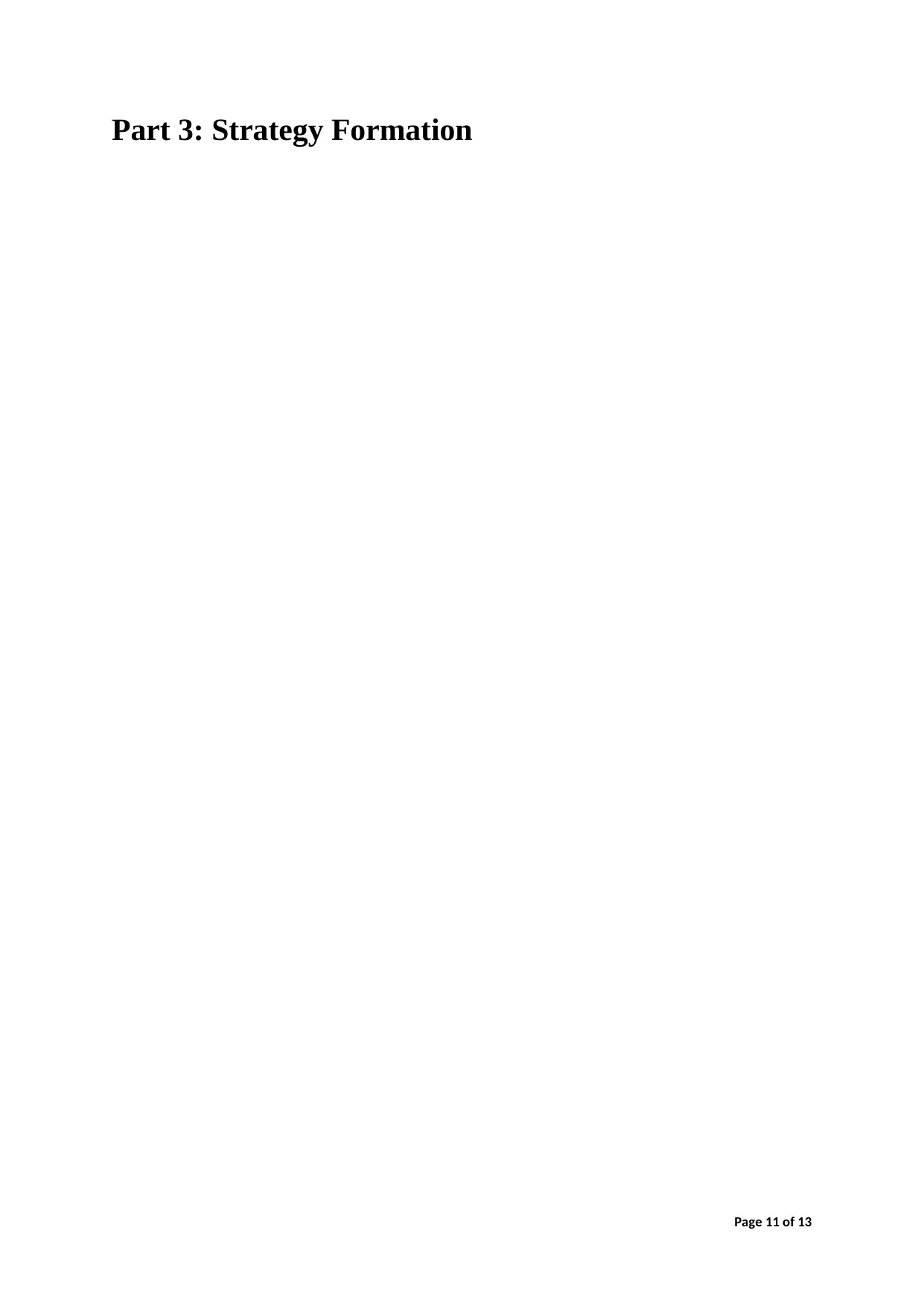
Part 3: Strategy Formation
Page 11 of 13
Page 11 of 13
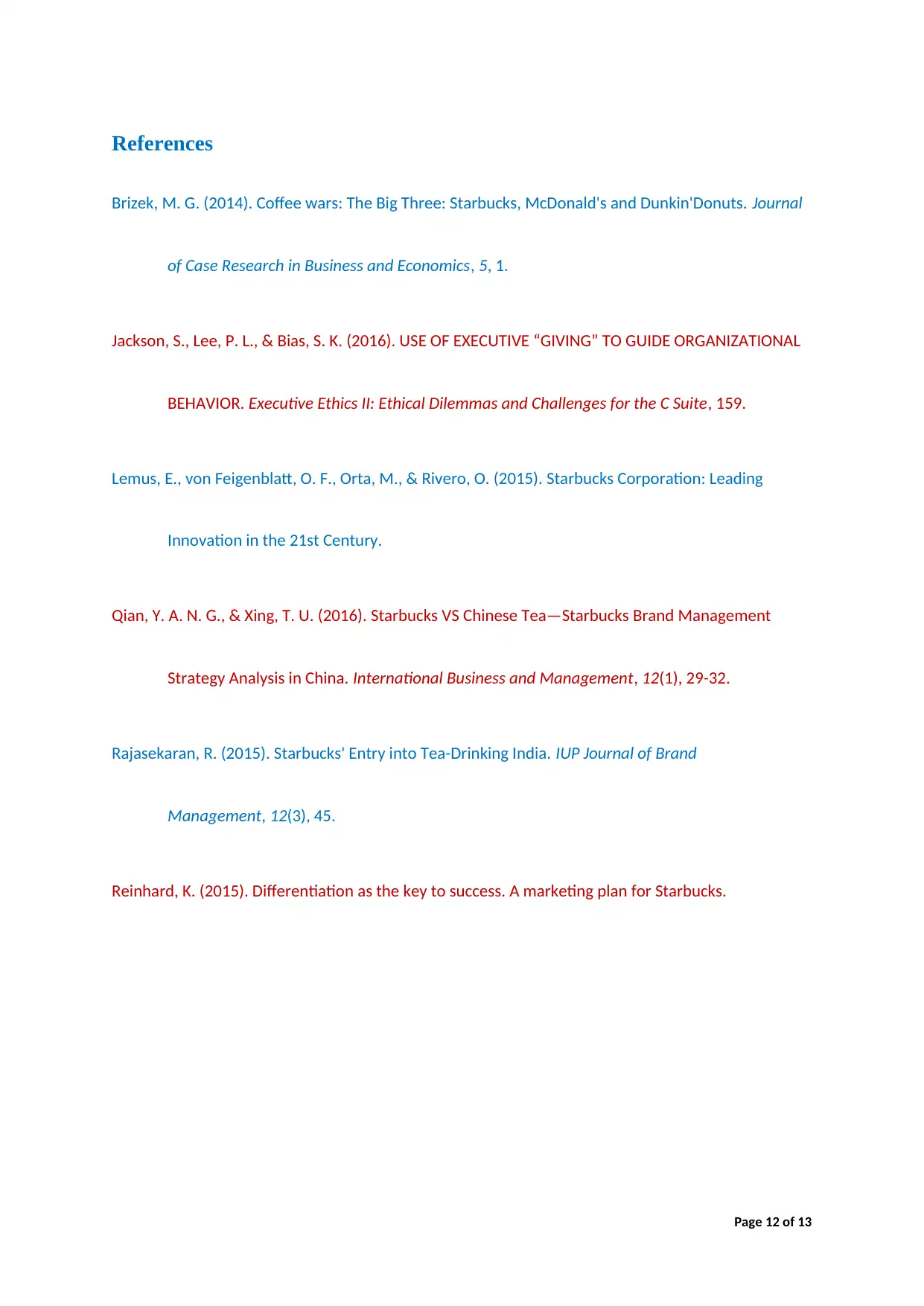
References
Brizek, M. G. (2014). Coffee wars: The Big Three: Starbucks, McDonald's and Dunkin'Donuts. Journal
of Case Research in Business and Economics, 5, 1.
Jackson, S., Lee, P. L., & Bias, S. K. (2016). USE OF EXECUTIVE “GIVING” TO GUIDE ORGANIZATIONAL
BEHAVIOR. Executive Ethics II: Ethical Dilemmas and Challenges for the C Suite, 159.
Lemus, E., von Feigenblatt, O. F., Orta, M., & Rivero, O. (2015). Starbucks Corporation: Leading
Innovation in the 21st Century.
Qian, Y. A. N. G., & Xing, T. U. (2016). Starbucks VS Chinese Tea—Starbucks Brand Management
Strategy Analysis in China. International Business and Management, 12(1), 29-32.
Rajasekaran, R. (2015). Starbucks' Entry into Tea-Drinking India. IUP Journal of Brand
Management, 12(3), 45.
Reinhard, K. (2015). Differentiation as the key to success. A marketing plan for Starbucks.
Page 12 of 13
Brizek, M. G. (2014). Coffee wars: The Big Three: Starbucks, McDonald's and Dunkin'Donuts. Journal
of Case Research in Business and Economics, 5, 1.
Jackson, S., Lee, P. L., & Bias, S. K. (2016). USE OF EXECUTIVE “GIVING” TO GUIDE ORGANIZATIONAL
BEHAVIOR. Executive Ethics II: Ethical Dilemmas and Challenges for the C Suite, 159.
Lemus, E., von Feigenblatt, O. F., Orta, M., & Rivero, O. (2015). Starbucks Corporation: Leading
Innovation in the 21st Century.
Qian, Y. A. N. G., & Xing, T. U. (2016). Starbucks VS Chinese Tea—Starbucks Brand Management
Strategy Analysis in China. International Business and Management, 12(1), 29-32.
Rajasekaran, R. (2015). Starbucks' Entry into Tea-Drinking India. IUP Journal of Brand
Management, 12(3), 45.
Reinhard, K. (2015). Differentiation as the key to success. A marketing plan for Starbucks.
Page 12 of 13
1 out of 13
Your All-in-One AI-Powered Toolkit for Academic Success.
+13062052269
info@desklib.com
Available 24*7 on WhatsApp / Email
![[object Object]](/_next/static/media/star-bottom.7253800d.svg)
Unlock your academic potential
© 2024 | Zucol Services PVT LTD | All rights reserved.


